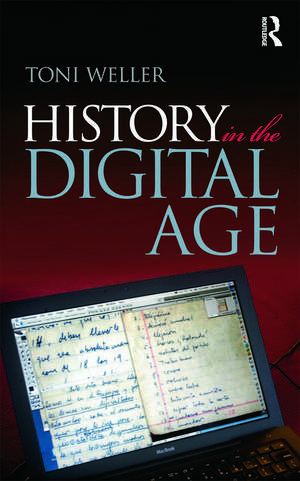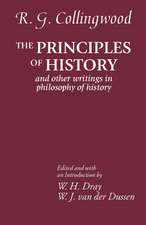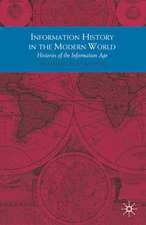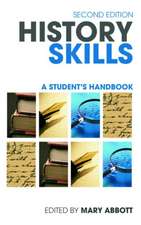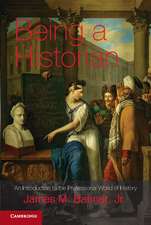History in the Digital Age
Editat de Toni Welleren Limba Engleză Paperback – 26 sep 2012
Including international contributors from a variety of disciplines - History, English, Information Studies and Archivists – this book does not seek either to applaud or condemn digital technologies, but takes a more conceptual view of how the field of history is being changed by the digital age. Essential reading for all historians.
| Toate formatele și edițiile | Preț | Express |
|---|---|---|
| Paperback (1) | 367.90 lei 6-8 săpt. | |
| Taylor & Francis – 26 sep 2012 | 367.90 lei 6-8 săpt. | |
| Hardback (1) | 1001.70 lei 6-8 săpt. | |
| Taylor & Francis – 26 sep 2012 | 1001.70 lei 6-8 săpt. |
Preț: 367.90 lei
Nou
Puncte Express: 552
Preț estimativ în valută:
70.40€ • 73.50$ • 58.26£
70.40€ • 73.50$ • 58.26£
Carte tipărită la comandă
Livrare economică 04-18 aprilie
Preluare comenzi: 021 569.72.76
Specificații
ISBN-13: 9780415666978
ISBN-10: 041566697X
Pagini: 224
Ilustrații: 5 black & white halftones
Dimensiuni: 156 x 234 x 13 mm
Greutate: 0.41 kg
Ediția:New.
Editura: Taylor & Francis
Colecția Routledge
Locul publicării:Oxford, United Kingdom
ISBN-10: 041566697X
Pagini: 224
Ilustrații: 5 black & white halftones
Dimensiuni: 156 x 234 x 13 mm
Greutate: 0.41 kg
Ediția:New.
Editura: Taylor & Francis
Colecția Routledge
Locul publicării:Oxford, United Kingdom
Public țintă
Postgraduate and UndergraduateCuprins
Introduction: History in the Digital Age. Part 1. Re-conceptualising history in the digital age 1. Spatial humanities: space, time, and place in the new digital age 2. The making of history: remediating historicised experience 3. A method for navigating the infinite archive Part 2. Studying history in the digital age 4. Doing and making: history as digital practice. 5. On collecting, cataloguing and collating the evidence of reading: the ‘RED movement’ and its implications for digital scholarship 6. Writing history with the digital image - a cautious celebration Part 3. Teaching history in the digital age 7. Studying the past in the digital age: from tourist to explorer. 8. Beyond ctrl-c, ctrl-v – teaching and learning history in the digital age Part 4. The future of history in the digital age 9. New universes or black holes? Does digital change anything? 10. Conclusion: A Changing Field
Recenzii
"This is a book that is well overdue. At long last it provides an account of Digital History as a field with something to offer to the discipline as a whole. It should be read by anyone who thinks that developments in IT are likely to change the way historians work, whether they are enthusiasts, critics or just curious." - Dr Ian Gregory, Lancaster University, UK
"Drawing on an international and interdisciplinary set of authors, this book brings together many of the key issues in the nascent field of Digital History, and examines the multiplicity of ways in which digital sources, digital projects, and digital methodologies have impacted the study, practice, and teaching of history itself. Arguing for the increasing centrality to historians from students to scholars of understanding the creation, preservation, and use of traditional, digitized, and born-digital sources, History in the Digital Age grapples with the methodological and practical implications of shifting from information scarcity to information flood, of engaging with multiple mediums of historical sources and projects, and of retaining history’s scholarly and theoretical rigor. History in the Digital Age is strongly recommended for anyone interested in the future of history." - Jeffrey W. McClurken, University of Mary Washington, USA
"The importance of the role of digital resources in academic life is highlighted by the recent emergence of the new discipline of digital humanities at many universities around the world. In this context, the collection of essays under review addresses pedagogical issues around the study and teaching of history in the digital age...[and] those who have concerns about the role of digitization in the historical discipline will find much here to ponder...in a way that is informative and challenging." - Thomas P. Power, University of Toronto
"Drawing on an international and interdisciplinary set of authors, this book brings together many of the key issues in the nascent field of Digital History, and examines the multiplicity of ways in which digital sources, digital projects, and digital methodologies have impacted the study, practice, and teaching of history itself. Arguing for the increasing centrality to historians from students to scholars of understanding the creation, preservation, and use of traditional, digitized, and born-digital sources, History in the Digital Age grapples with the methodological and practical implications of shifting from information scarcity to information flood, of engaging with multiple mediums of historical sources and projects, and of retaining history’s scholarly and theoretical rigor. History in the Digital Age is strongly recommended for anyone interested in the future of history." - Jeffrey W. McClurken, University of Mary Washington, USA
"The importance of the role of digital resources in academic life is highlighted by the recent emergence of the new discipline of digital humanities at many universities around the world. In this context, the collection of essays under review addresses pedagogical issues around the study and teaching of history in the digital age...[and] those who have concerns about the role of digitization in the historical discipline will find much here to ponder...in a way that is informative and challenging." - Thomas P. Power, University of Toronto
Descriere
Historians have only very recently started thinking about the impact of the digital age on how we study history. This book explores changing perceptions of the field of history in the digital age, and examines new questions, challenges and opportunities in the field of historical study, teaching and learning. The volume includes chapters on the conceptual challenges and opportunities faced by scholars and students of history brought about by the digital age, the topicality of the issue and the differences and similarities in geographic approach, especially in the UK and North America, and discusses whether the digital age is helping history become more universal.
